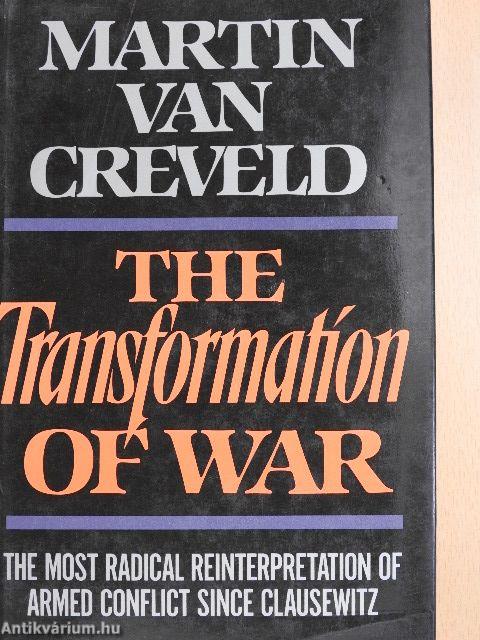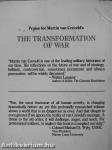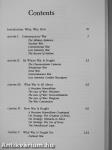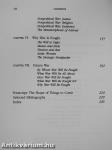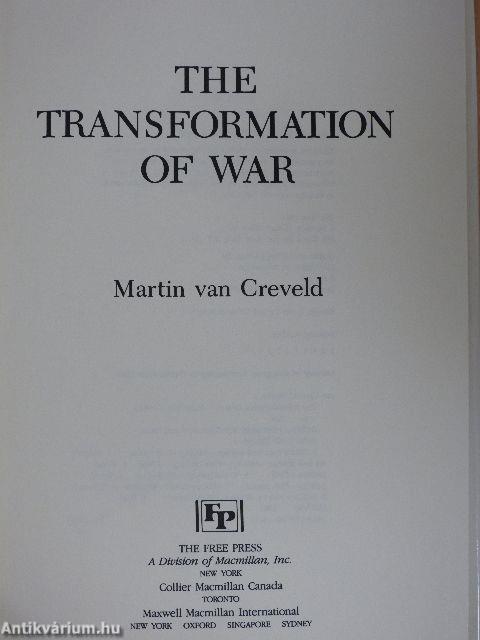1.063.113
kiadvánnyal nyújtjuk Magyarország legnagyobb antikvár könyv-kínálatát

VISSZA
A TETEJÉRE
JAVASLATOKÉszre-
vételek
The Transformation of War
The Most Radical Reinterpretation of Armed Conflict since Clausewitz
| Kiadó: | The Free Press-Collier Macmillan Canada-Maxwell Macmillan International |
|---|---|
| Kiadás helye: | New York |
| Kiadás éve: | |
| Kötés típusa: | Fűzött keménykötés |
| Oldalszám: | 254 oldal |
| Sorozatcím: | |
| Kötetszám: | |
| Nyelv: | Angol |
| Méret: | 24 cm x 16 cm |
| ISBN: | 0-02-933155-2 |
naponta értesítjük a beérkező friss
kiadványokról
naponta értesítjük a beérkező friss
kiadványokról
Előszó
TovábbFülszöveg
Praise for Martin van Creveld's
THE TRANSFORMATION OFWAR
"Martin van Creveld is one of the leading military historians of our time. His reflections on the future of war and of strategy, brilliant, controversial, sometimes premature and always provocative, will be widely discussed."
—Walter Laqueur Author oi Stalin: The Glasnost Revelations
"War, the most fearsome of all human activity, is changing dramatically before us; yet this profoundly researched volume shows a world that is as dangerous as ever. And that danger is even greater if we ignore the reality of van Creveld's message. A threat to the old order, it will challenge, anger, and teach. For professional soldiers, to neglect this book is to neglect our duty."
-ColonelMichaelD. Wyly, USMC Vice-President Marine Corps University
I ¦ ¦
'-li:;'
I 1
i'! . !
I I
i ' 1 I' i ¦
V. ¦! \ I ¦ ,
At a time when unprecedented change in international affairs is forcing governments, citizens, and armed forces everywhere to... Tovább
Fülszöveg
Praise for Martin van Creveld's
THE TRANSFORMATION OFWAR
"Martin van Creveld is one of the leading military historians of our time. His reflections on the future of war and of strategy, brilliant, controversial, sometimes premature and always provocative, will be widely discussed."
—Walter Laqueur Author oi Stalin: The Glasnost Revelations
"War, the most fearsome of all human activity, is changing dramatically before us; yet this profoundly researched volume shows a world that is as dangerous as ever. And that danger is even greater if we ignore the reality of van Creveld's message. A threat to the old order, it will challenge, anger, and teach. For professional soldiers, to neglect this book is to neglect our duty."
-ColonelMichaelD. Wyly, USMC Vice-President Marine Corps University
I ¦ ¦
'-li:;'
I 1
i'! . !
I I
i ' 1 I' i ¦
V. ¦! \ I ¦ ,
At a time when unprecedented change in international affairs is forcing governments, citizens, and armed forces everywhere to re-assess the question of whether military solutions to political problems are possible any longer, Martin van Creveld has written an audacious searching examination of the nature of war and of its radical transformation in our own time.
For 200 years, military theory and strategy have been guided by the Clausewitzian assumption that war is rational - a reflection of national interest and an extension of politics by other means. However, van Creveld argues, the overwhelming pattern of conflict in the post-1945 world no longer yields fully to rational analysis. In fact, strategic planning based on such calculations is, and will continue to be, unrelated to current realities.
Small-scale military eruptions around the globe have demonstrated new forms of warfare with a different cast of characters — guerilla armies, terrorists, and bandits — pursuing diverse goals by violent means with the most primitive to the most sophisticated weapons. Although these warriors and their tactics testify to the end of conventional war as we've known it, the public and the military in the developed world continue to contemplate organized violence as conflict between the super powers.
At this moment, armed conflicts of the type van Creveld describes are occurring throughout the world. From Lebanon to Cambodia, from Sri Lanka HAdthe Philippines to El Salvador, the Persian Gulf, and the strife-torn nations of Eastern Europe, violent confrontations confirm a new model of warfare in which tribal, ethnic, and religious factions do battle without high-tech weapons or state-supported armies and resources. This low-intensity conffict challenges existing distinctions between civilian and soldier, individual crime and organized violence, terrorism and war. In the present global atmosphere, practices that for three centuries have been considered uncivilized, such as capturing civilians or even entire communities for ransom, have begun to reappear.
(Continued on back fktfi) Vissza
Témakörök
Martin van Creveld
Martin van Creveld műveinek az Antikvarium.hu-n kapható vagy előjegyezhető listáját itt tekintheti meg: Martin van Creveld könyvek, művekMegvásárolható példányok
Nincs megvásárolható példány
A könyv összes megrendelhető példánya elfogyott. Ha kívánja, előjegyezheti a könyvet, és amint a könyv egy újabb példánya elérhető lesz, értesítjük.



